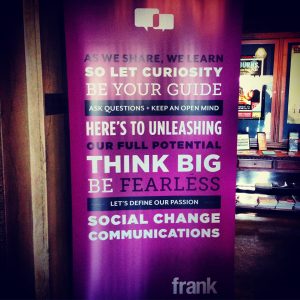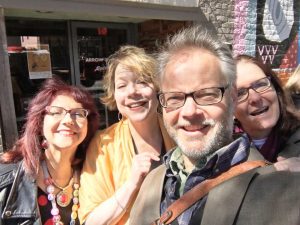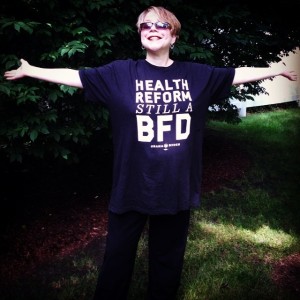Posted on: February 26th, 2017 by Amy Lynn Smith
When I told a colleague I was heading to frank, the annual gathering of social change communicators and movement builders, she replied, “Please change our world for us.” That may sound like a very tall order — especially at this time in America’s ever-unfolding story — but it’s exactly what all of us at frank hope to do, each in our own way, every day.
 I first discovered frank and the Public Interest Communications program at the University of Florida when I received a mysterious email that nudged me to request an invite to the 2015 gathering if I thought I belonged. I did, and I was delighted they agreed. It only took me about an hour at frank 2015 to realize I’d found my tribe. I knew there were other people who do the work I do, but I didn’t know there was a name for this emerging field, let alone an academic curriculum. I certainly didn’t know there was a time and place where we could all come together to inspire and learn from each other.
I first discovered frank and the Public Interest Communications program at the University of Florida when I received a mysterious email that nudged me to request an invite to the 2015 gathering if I thought I belonged. I did, and I was delighted they agreed. It only took me about an hour at frank 2015 to realize I’d found my tribe. I knew there were other people who do the work I do, but I didn’t know there was a name for this emerging field, let alone an academic curriculum. I certainly didn’t know there was a time and place where we could all come together to inspire and learn from each other.
The frank 2017 gathering feels more necessary than ever. Although frank isn’t a partisan entity, the majority of the work attendees do is liberal-leaning: pushing for equality, fairness and justice for all, among other things. And the precarious position of the United States and the world right now makes the work we do feel particularly urgent; it makes the solidarity of like-minded souls feel like essential solace in troubled times.
I’m honored to be part of the frank 2017 steering committee, which includes some of the very best and brightest minds in social change communications. Heading into the 2016 election, we were already talking about how to make sure the view from both sides is explored in this year’s talks and programming, which all center around the theme of curiosity. But in our planning meeting just days after the election, we all recognized that we face a particularly daunting task in the “post-truth” era. How do we educate people — and mobilize them to act and evolve — when it seems a large segment of the American population no longer cares about the truth? During that meeting, I personally felt a sense of profound gratitude that I work in a field where my efforts can make a tangible difference.
 A few weeks ago, frank asked us to submit our burning questions of the moment — what we’re curious about right now. One of my questions asked how we can motivate people to recognize and believe in facts in the post-truth era. Another pondered how we continue our work for social change in the midst of animosity, anger and aggression from both sides, without losing our equilibrium in the process. It’s not just about making the world a better place, but also taking good care of each other while we do it.
A few weeks ago, frank asked us to submit our burning questions of the moment — what we’re curious about right now. One of my questions asked how we can motivate people to recognize and believe in facts in the post-truth era. Another pondered how we continue our work for social change in the midst of animosity, anger and aggression from both sides, without losing our equilibrium in the process. It’s not just about making the world a better place, but also taking good care of each other while we do it.
These are just some of the many questions I know my time at frank will answer. I’m looking forward to this year’s gathering not only for mission-critical information, but also for the camaraderie of others doing the same work I do. I’ll be reunited with friends and colleagues and will meet new ones, knowing we begin united by a mutual concern for the future of our country and our world.
I’m still pinching myself that the frank community has shoulder-tapped me to be more than an attendee. Two years running, I’ve had the pleasure of serving as a speaker coach, helping world-class thinkers prepare remarks you won’t see anywhere but frank. If you’re not going to be at frank, you can catch the livestream or re-casts. Every speaker I’m working with has opened my mind and my heart to new ideas, and I can’t wait to watch them shine and to absorb what their fellow speakers have to say.
This year, I also have the honor of hosting a “scrum” — the frank version of a breakout session. I’ll be leading a group brainstorm about how to use storytelling strategically to educate and engage the public around healthcare topics, with protecting the Affordable Care Act as one pressing issue. It’s work I’ve been doing for years, and I’m excited to share it with my fellow franksters.
 The frank motto is “Don’t settle for small change” — a lofty aspiration, particularly right now, when many American leaders would rather see us regress instead of moving forward. But I have faith. I have faith in frank and my fellow franksters. I have faith in the goodness of people, particularly as I see how they’re taking action to protect what already makes America great. I have faith that change is possible, even at a time when we may feel immutably stuck.
The frank motto is “Don’t settle for small change” — a lofty aspiration, particularly right now, when many American leaders would rather see us regress instead of moving forward. But I have faith. I have faith in frank and my fellow franksters. I have faith in the goodness of people, particularly as I see how they’re taking action to protect what already makes America great. I have faith that change is possible, even at a time when we may feel immutably stuck.
I’ll be sharing my insights and experiences at frank on Twitter and Facebook, and will surely have more to say here after the gathering. For now, suffice to say that I can’t wait to reunite with my tribe. I am infinitely curious to discover all the ways we can help each other do more good. And yes, change our world.
[Photo credits: Top image by LAF Lines Photography; photos from frank 2015 and frank 2016 by Amy Lynn Smith.]
 When working in public interest communication, issue advocacy or social change communication, nothing is more powerful than centering stories around the voices of those most impacted by an issue. If someone is incarcerated, let them speak for themselves. If someone wants to share their journey as a transgender person, lift up their voice and stay out of the way, something I worked hard to do in my transgender story series at Eclectablog. If a person is struggling to make ends meet because they’re not earning a living wage, let them talk about their own lived experience.
When working in public interest communication, issue advocacy or social change communication, nothing is more powerful than centering stories around the voices of those most impacted by an issue. If someone is incarcerated, let them speak for themselves. If someone wants to share their journey as a transgender person, lift up their voice and stay out of the way, something I worked hard to do in my transgender story series at Eclectablog. If a person is struggling to make ends meet because they’re not earning a living wage, let them talk about their own lived experience.
 I’m talking about the
I’m talking about the  I first discovered
I first discovered  A few weeks ago, frank asked us to submit our burning questions of the moment — what we’re curious about right now. One of my questions asked how we can motivate people to recognize and believe in facts in the post-truth era. Another pondered how we continue our work for social change in the midst of animosity, anger and aggression from both sides, without losing our equilibrium in the process. It’s not just about making the world a better place, but also taking good care of each other while we do it.
A few weeks ago, frank asked us to submit our burning questions of the moment — what we’re curious about right now. One of my questions asked how we can motivate people to recognize and believe in facts in the post-truth era. Another pondered how we continue our work for social change in the midst of animosity, anger and aggression from both sides, without losing our equilibrium in the process. It’s not just about making the world a better place, but also taking good care of each other while we do it. The frank motto is “Don’t settle for small change” — a lofty aspiration, particularly right now, when many American leaders would rather see us regress instead of moving forward. But I have faith. I have faith in frank and my fellow franksters. I have faith in the goodness of people, particularly as I see how they’re taking action to protect what already makes America great. I have faith that change is possible, even at a time when we may feel immutably stuck.
The frank motto is “Don’t settle for small change” — a lofty aspiration, particularly right now, when many American leaders would rather see us regress instead of moving forward. But I have faith. I have faith in frank and my fellow franksters. I have faith in the goodness of people, particularly as I see how they’re taking action to protect what already makes America great. I have faith that change is possible, even at a time when we may feel immutably stuck.



